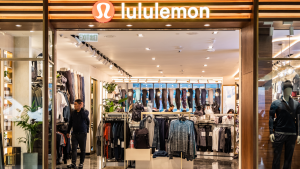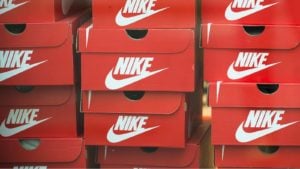The pandemic changed a lot of things about the way we live including how we work out. People were stuck inside due to pandemic lockdowns that shuttered gyms, instantly spiking demand for at home workout solutions. That said, as we can see from home fitness stocks, the in-home fitness phenomenon was not simply limited to the pandemic era.
With the pandemic now in the rear view mirror the trends still continue to be positive. Compound annual growth approaching 5% is expected through 2030. More and more fitness enthusiasts are looking for ways to increase their at home workout options. That will continue to have effects on home fitness stocks across the sector, particularly those below.
Lululemon (LULU)

Lululemon (NASDAQ:LULU) is simply one of those brands that continues to get it right. Investors benefit from consistent growth rates in the double digits that continue to make its stock strong today. In fact, Lululemon saw its revenues grow by 19% in the most recent period, reaching $2.2 billion.
It’s pretty incredible considering that Lululemon first reached $1 billion in quarterly sales back in early 2019. Lululemon is a great business for the simple fact that it has managed to create an in-demand brand that has significant value. the company undoubtedly produces quality apparel but at its heart it’s still a very inexpensive business model. Perhaps no metric better reflects this fact than Lululemon’s 57% margins.
In short, Lululemon continues to be a strong investment based on its fundamentals. The company continues to make decisions that will positively affect its stock price including continued repurchases. The company approved an additional $1 billion share repurchase program in late November and has an additional $243 Million worth of repurchases on a previous repurchase plan.
Nike (NKE)

Nike (NYSE:NKE) stock is getting pounded as I write this. The company reported strong second quarter metrics but it simply wasn’t enough as the company also forecast softening during the second half of its fiscal year.
Revenues at Nike increased by 21% during its second quarter but despite the beat shares dropped by 11% during the day. The market isn’t worried about its current revenues but instead is worried about Nike’s projection of softening sails during H2.
Meanwhile, Nike is looking to identify $2 billion in cost savings over the next 3 years. That will include the layoffs expected to result In between $400 to $450 million in severance charges.
In my mind this is a strong contrarian opportunity and is reflective of an overreaction on the market’s behalf. Nike continues to be the premier sports apparel brand and benefits from the strong workout from home trend. Moreover, the market simply tends to overreact to news such as this and that creates an opportunity in the immediate term.
Peloton (PTON)

Peloton (NASDAQ:PTON) is the most readily identifiable stock that capitalized on the workout from home trend. The company invested heavily into marketing during the pandemic and benefited greatly. However, I don’t recommend investing in Peloton at this point. The company continues to head in the wrong direction as reflected in its most recent financial statements.
It’s been a very traumatic rise and fall for Peloton. PTON is a stock that rose from $20 at the onset of the pandemic to more than $160 by early 2021. It currently trades for around $6.
Revenues are on the decline although not substantially. However, it doesn’t matter because the company simply continues to lose massive amounts of money. Peloton lost more than $159 million in the most recent quarter. Although it was far less than the $408.5 million the company lost a year prior, it probably doesn’t matter.
Simply put, Peloton is in trouble. In fact, Peloton is at risk of going bankrupt based on its Altman Z score, a measure of distress.
On the date of publication, Alex Sirois did not have (either directly or indirectly) any positions in the securities mentioned in this article. The opinions expressed in this article are those of the writer, subject to the InvestorPlace.com Publishing Guidelines.

